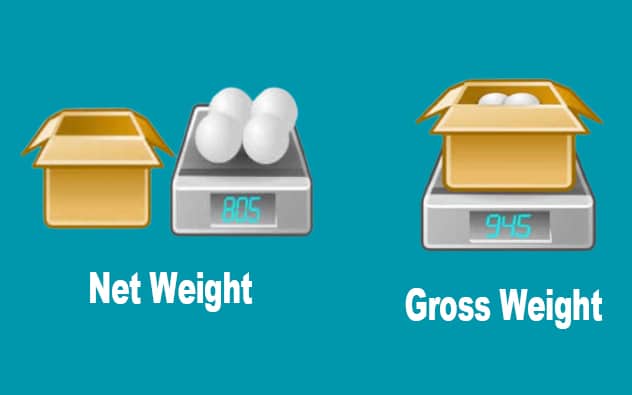
When preparing a shipment, it is crucial to understand the differences in shipping weights and the regulations that apply to them to calculate your production and shipping costs better.
Gross Weight Vs. Net Weight are two types of weights, but most people don’t know what they mean and the differences.
This guide will answer all the most common questions about Gross Weight Vs. Net Weight.
Why is Knowing Gross Weight Vs. Net Weight Important?

Gross Weight Vs. Net Weight used for weight calculation always occur regardless of whether the goods are transported by sea, air, or rail.
Most shipping documents related to the goods must refer to the weight, a crucial element for freight forwarders.
Usually, weight is used to determine the shipping cost. But when it comes to Gross Weight Vs. Net Weight, things are not always as simple as they seem.
So, it would help if you understood clearly the Gross Weight Vs. Net Weight. There should be no misunderstandings in the paperwork provided by the shipping company.
For bills of lading, weight becomes an important factor as it is one of its main components.
What is Gross Weight?
Gross weight is the total weight of all items in the shipment.
So, gross weight means total weight, which includes any additional weight that comes with the shipment, and the added weight can be the packaging.
Here is a simple formula to remember the gross weight.
Gross weight = product weight + packaging weight
What is Net Weight?
Net weight is the weight of the product itself.
So, net weight means the weight that does not include packaging or is not placed in a container.
It also refers to the total amount of inventory or cargo on board, excluding the weight of containers, packaging, or other cargo protection equipment, such as racks or pallets, used to secure the load.
Here is a simple formula to remember the net weight.
Net weight = product quantity X product weight
What is the Difference Between Gross Weight and Net Weight?
The terms gross weight and net weight are most often used when measuring the weight of a shipment or any packaged item.
The main difference between gross weight and net weight is that the former refers to the total weight of the shipped item, including the packaging.
In contrast, the latter refers only to the item’s weight in the package, excluding the packaging.
Another critical difference is that the gross weight varies depending on the type of shipment, while the net weight is the same in all cases.
We can get the gross weight by adding the weight of the original product to the weight of the transport tools, while we can get the net weight by subtracting the weight of the transport vehicle from the gross weight.
Some differences between gross and net weight

Gross weight is the total weight of the goods. Net weight is just the product’s weight, not including its packaging.
You can interpret the net weight as the weight without the packaging, while the gross weight includes the weight of the packaging.
You can use the following two formulas to calculate gross weight and net weight.
Gross weight = net weight + packaging weight
Net weight = gross weight – packaging weight
How to Calculate the Net Weight?
Suppose you are an exporter of thermoses from China. The weight of each thermos without packaging is 0.3kg. If 20,000 pcs are delivered, the total net weight of the shipment is 6,000kgs.
For the calculation of net weight, refer to the formula.
Net weight = total quantity X weight per piece
Net weight = 20,000 x 0.3
Net weight = 6,000kgs
How to Calculate the Gross Weight?
Let’s continue with the example of a thermos exporter. Each thermos without packaging is 0.3kg, so the net weight of 20,000pcs is 6,000kgs.
Considering that each thermos box has a pack of desiccant and paper instructions, all weight is about 30g.
This means that each thermos packed in the box is 0.33kg, so the total weight of 20,000pcs thermoses plus 20,000 boxes is about 6,600kgs.
But that’s not all.
There are racks/pallets to hold the goods, which weigh about 600kgs. In addition, there is a 20ft container that weighs 1,800kgs when empty, which means that the total gross weight will now be 9,000kgs.
For the calculation of gross weight, refer to the example.
Gross weight = net weight + packaging weight + rack/pallet weight + container weight
Gross weight = 6,000 + 600 + 600 + 1800
Gross weight = 9,000kgs
How do Gross Weight and Net Weight Affect Shipping Costs?
The weight of any goods is one of the most critical factors in determining shipping costs.
Net weight is the weight of the product itself, not including packaging. Gross weight is the net weight plus the weight of any cartons or boxes used as packaging.
For critical shipments that need to get to their destination quickly, weight and distance can affect shipping costs.
For example, in airfreight, the shape and weight of the cargo affect the shipping cost.
The size and volume are also important because the size of the product tells you how much space it will take up. Usually, heavier shipments tend to get a volume discount rate.
In general, knowing the net and gross weight of a shipment will make shipping easier. The weight determines its weight cut-off point and the discounts on your shipping costs.
You can reduce your shipping costs by using lighter or smaller packaging materials, which reduces the overall gross weight and shipping cost.
Gross Weight Vs. Net Weight: FAQ
1. How to calculate Gross Weight Vs. Net Weight?
Gross weight is the weight of the product plus the packaging weight. Net Weight is only the weight of the product itself.
2. Does the customs declaration need gross weight or net weight?
The customs declaration document requests gross weight and net weight, both need to be reflected, try to be more accurate, but a little error does not affect the customs declaration.
3. How to write the customs declaration’s gross weight and net weight?
The gross weight and net weight must be the same as those shown on the packing list.
Also, the total gross weight and total net weight of the whole shipment should be reported, not the weight of one or several items.
Gross Weight Vs. Net Weight: Conclusion
In short, when shipping from China, it is crucial to have a correct understanding of gross weight vs. net weight because it is essential to have a thorough knowledge of shipping weight to get a better quote from the shipping company.
We hope this guide on gross vs. net weight will help you. At Yansourcing, we make shipping from China easy and economical. Contact us today for all your shipping needs.
